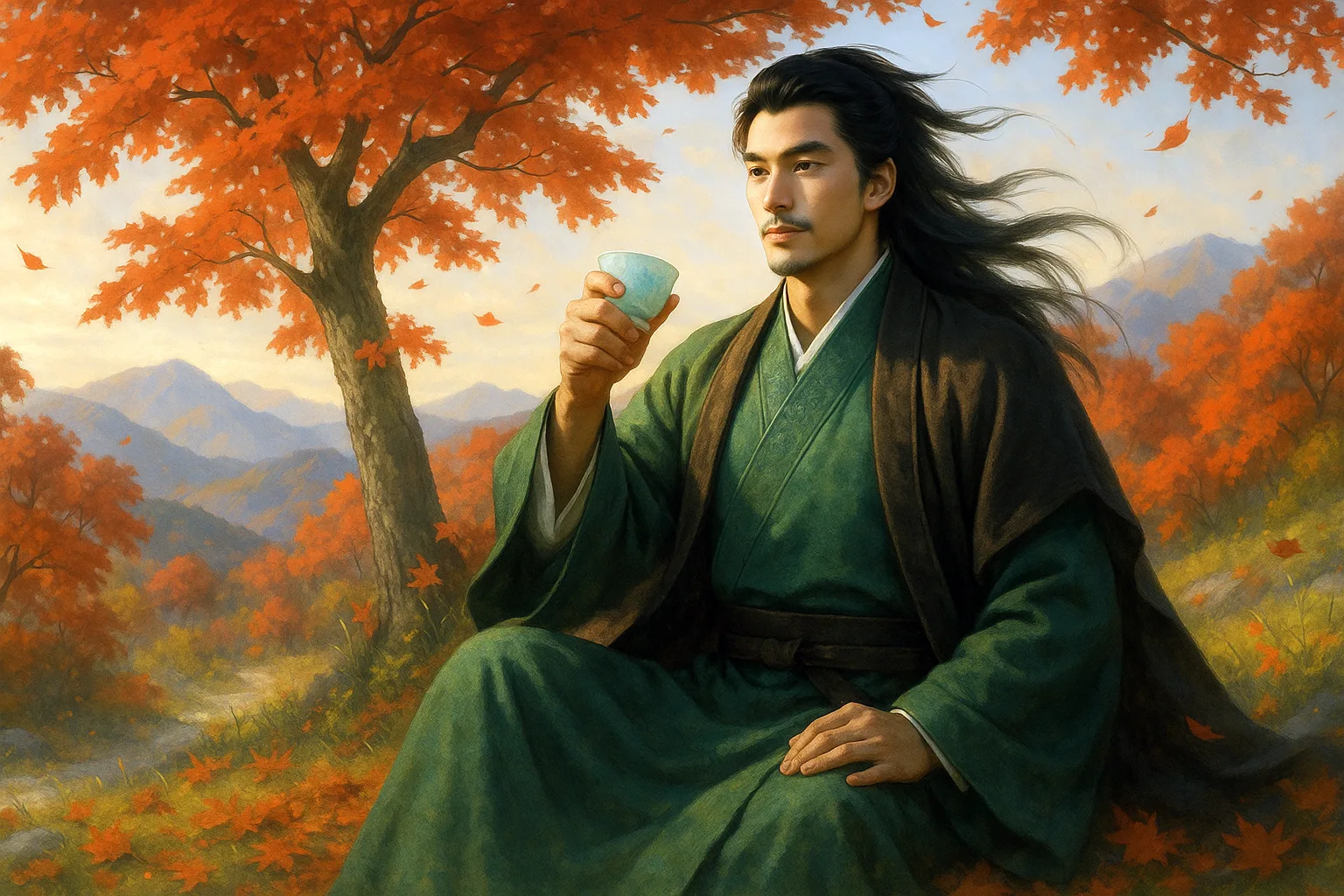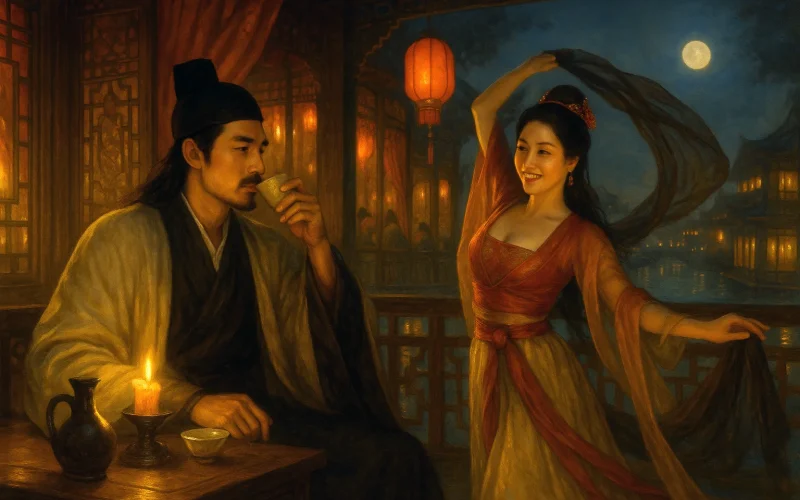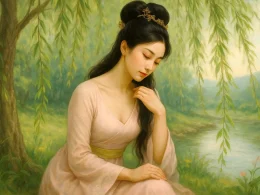Mist veils the cold stream, and moonlight the sand,
As I moor in the shadow of a river-tavern,
Where girls, with no thought of a perished kingdom,
Gaily echo A Song of Courtyard Flowers.
Original Poem
「泊秦淮」
杜牧
烟笼寒水月笼沙,夜泊秦淮近酒家。
商女不知亡国恨,隔江犹唱后庭花。
Interpretation
"A Mooring on the Qinhuai River"** was written around 850 AD during the reign of Emperor Xuanzong of the Tang Dynasty. At the time, Du Mu was serving as a local official and, while traveling, moored his boat on the Qinhuai River at night. The Qinhuai River was once a gathering place for the nobility of the Southern Dynasties, where the last ruler of the Chen Dynasty indulged in pleasure and composed the song "Jade Tree, Backyard Flowers," which became a symbol of national decline and eventual collapse. As Du Mu observed the scene before him, he was reminded of this historical tragedy and used it to satirize the rulers of the late Tang Dynasty, who, like their predecessors, ignored the lessons of history and indulged in decadence.
First Couplet: "烟笼寒水月笼沙,夜泊秦淮近酒家。"
Yān lóng hán shuǐ yuè lóng shā, yè bó Qínhuái jìn jiǔ jiā.
Mist shrouds the cold water; moonlight blankets the sand. At night, I moor on the Qinhuai River, near a tavern.
Du Mu begins with a tranquil yet melancholic scene. The mist and moonlight create a hazy, serene atmosphere, while the cold water and sand evoke a sense of desolation. The phrase "near a tavern" (近酒家) introduces a contrast between the quiet river and the lively tavern, hinting at the poet's inner turmoil and foreshadowing the critique to come.
Second Couplet: "商女不知亡国恨,隔江犹唱《后庭花》。"
Shāng nǚ bù zhī wáng guó hèn, gé jiāng yóu chàng "Hòutíng huā."
The singing girls know nothing of the pain of a fallen nation; across the river, they still sing "Backyard Flowers."
This couplet uses irony to deliver a sharp critique. On the surface, it appears to lament the ignorance of the singing girls, but in reality, it targets the ruling class of the late Tang Dynasty, who, like the girls, are oblivious to the lessons of history. The song "Backyard Flowers" (后庭花), a symbol of the Chen Dynasty's downfall, serves as a poignant reminder of the consequences of decadence and neglect. The word "still" (犹) underscores the ongoing folly of those in power, who continue to indulge in pleasure despite the looming threat of national decline.
Overall Appreciation
This short poem is rich in meaning and emotion.
The first couplet sets the scene with a tranquil yet melancholic atmosphere. The mist and moonlight create a sense of quiet beauty, while the cold water and sand evoke a feeling of desolation. The contrast between the serene river and the lively tavern hints at the poet's inner conflict and foreshadows the critique to come.
The second couplet shifts to a more pointed critique, using the singing girls and the song "Backyard Flowers" to symbolize the ignorance and decadence of the ruling class. The irony is subtle yet powerful, as Du Mu uses the girls' apparent innocence to highlight the deeper folly of those in power. The song, a symbol of national decline, serves as a stark reminder of the consequences of ignoring history.
The poem's strength lies in its ability to blend scene and emotion, using vivid imagery to convey a profound message. Du Mu's critique is not overt but is woven into the fabric of the poem, making it all the more impactful. The contrast between the serene river and the lively tavern, the ignorance of the singing girls and the folly of the rulers, creates a rich tapestry of meaning that resonates deeply with the reader.
Writing Characteristics
- Blending Scene and Emotion
Du Mu uses the tranquil yet melancholic scene of the Qinhuai River to evoke a sense of quiet beauty and desolation, setting the stage for his critique. - Irony and Satire
The poem's critique is delivered through irony, using the singing girls and the song "Backyard Flowers" to symbolize the ignorance and decadence of the ruling class. - Historical Allusion
The reference to "Backyard Flowers" and the downfall of the Chen Dynasty adds historical depth to the poem, underscoring the consequences of neglecting the lessons of history. - Subtle and Elegant Language
The poem's language is simple yet elegant, allowing the imagery and irony to convey the poet's message with clarity and impact.
Insights
This poem serves as a powerful reminder of the importance of learning from history. Du Mu's critique of the ruling class, who continue to indulge in pleasure despite the lessons of the past, resonates deeply in any era. The poem challenges us to remain vigilant and to avoid the pitfalls of decadence and neglect.
The contrast between the serene river and the lively tavern, the ignorance of the singing girls and the folly of the rulers, highlights the tension between beauty and decay, pleasure and responsibility. Du Mu's message is clear: those in power must remain aware of the consequences of their actions and strive to avoid the mistakes of the past.
Ultimately, "Mooring on the Qinhuai River" is a meditation on the fragility of nations and the importance of wisdom and foresight in leadership. It encourages us to reflect on our own lives and to seek a balance between enjoyment and responsibility, ensuring that we do not repeat the mistakes of history.
Poem translator
Kiang Kanghu
About the poet

Du Mu (杜牧), 803 - 853 AD, was a native of Xi'an, Shaanxi Province. Among the poets of the Late Tang Dynasty, he was one of those who had his own characteristics, and later people called Li Shangyin and Du Mu as "Little Li and Du". His poems are bright and colorful.












